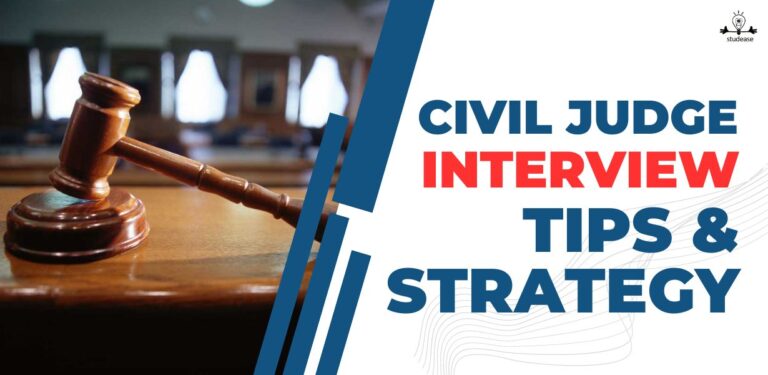120 Volleyball Player Interview Questions: Essential Inquiries for Insightful Conversations

If you’re preparing to Join volleyball team, knowing the right questions can make all the difference. Meaningful questions help you uncover different aspects, passion, and insights into the game.
This post covers 120 Volleyball Player Interview Questions.
By focusing on areas like motivation, teamwork, and personal goals, you can make a good addition to the team. Asking insightful questions allows the coach to capture the essence of what makes each player tick, making your interview memorable and engaging.
When speaking with players, it’s also important to touch on their experiences and challenges. Questions about their most significant achievements and how they overcame obstacles can reveal valuable life lessons.
This not only adds depth to the interview but also connects with readers who may face similar challenges in their endeavors.
Don’t forget to explore your future goals and aspirations. By doing so, you highlight your ambition and dedication, inspiring others who share a love for the sport. Whether they aim to compete at a higher level or contribute to the community, these questions show there’s more to volleyball.
Background and Early Life
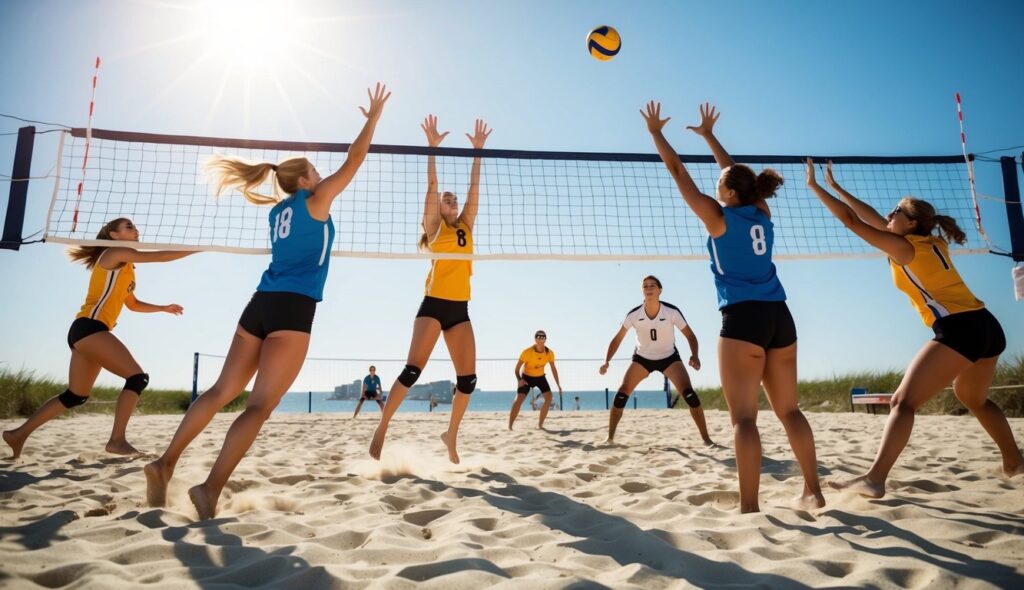
Volleyball players often start their journey at a young age. Early exposure to the sport can provide opportunities for skill development and can foster dedication and passion for the game.
Introduction to Volleyball
Getting introduced to volleyball often happens during school or through community programs. Some start playing in physical education classes, where basic skills like serving and passing are taught.
Others might join a local club or youth league. This can be beneficial for players, allowing them to access more structured training. Here, dedication is essential. You might find practices occur several times a week, focusing on various skills necessary for gameplay.
Training at this early stage often emphasizes building a solid foundation. Learning proper techniques early helps in developing skills effectively. This can make a huge difference as you grow and advance in the sport.
Technical and Tactical Proficiency

In this section, explore how volleyball players can improve their skills and strategies. Learn about mastering core skills, understanding game strategy, defensive techniques, injury prevention, and the importance of nutrition.
Mastering Core Skills
To excel in volleyball, you need to focus on a few core technical skills. Passing is essential; accurate passes set the tone for the game. Work on your forearm pass or bump consistently to improve accuracy.
Setting is another key skill. Perfecting this helps teammates make strong attacks. Practice finger positioning and footwork for consistent sets.
Focus on spiking to boost your offense. Work on timing, jump height, and aim for different attack angles. Lastly, serving is crucial. Practice different types of serves, to challenge opponents.
Understanding Game Strategy
Understanding the tactical side of volleyball can transform your play. Study the roles and formations on the court, like 5-1 or 6-2 formations. Learning these help you anticipate movements and adjust your position.
Understanding offensive strategies, such as quick sets or back-row attacks, gives you an edge. Work with your team to develop strategies tailored to your strengths.
For defense, analyzing opponent tendencies allows you to counter effectively. Know when to shift positions or execute digs to stop attacks. Consistent communication with teammates boosts strategic execution.
Defensive Skills and Receiving Serves
A strong defense begins with proper positioning. Stay low with knees bent, ready to react quickly. Practicing lateral movement improves agility.
Receiving serves requires focus and practice. Anticipate the ball’s direction by observing the server’s form. Keep your platform steady for accurate passes to the setter.
Block timing is crucial in preventing opponent kills. Work on jump timing and hand positioning to maximize coverage. Practice these skills regularly to improve reaction time and coordination on the court.
Injury Prevention and Recovery
Preventing injuries is vital for longevity in volleyball. Warm up thoroughly with dynamic stretches and specific drills to prepare muscles for intense activity. Focus on flexibility and strength training in areas like shoulders and knees.
Practice safe landings to minimize impact on joints.
Recovery is just as important. Incorporate sufficient rest days and light exercises like swimming or cycling for active recovery. Using ice or heat therapy can help reduce stiffness and soreness post-game.
Nutrition and Diet
Proper nutrition fuels your performance on the court. A balanced diet with proteins, carbohydrates, and fats provides energy and helps in muscle recovery. Consume proteins like chicken or tofu for muscle repair.
Hydration is essential; drink water consistently throughout the day, especially before and after games. For quick energy boosts, consider snacks like bananas or energy bars.
Plan meals around game schedules. Consume a carbohydrate-rich meal 2-3 hours before playing. Post-game, focus on replenishing energy and repairing muscles with a combination of carbs and proteins.
List of 120 Volleyball Player Interview Questions
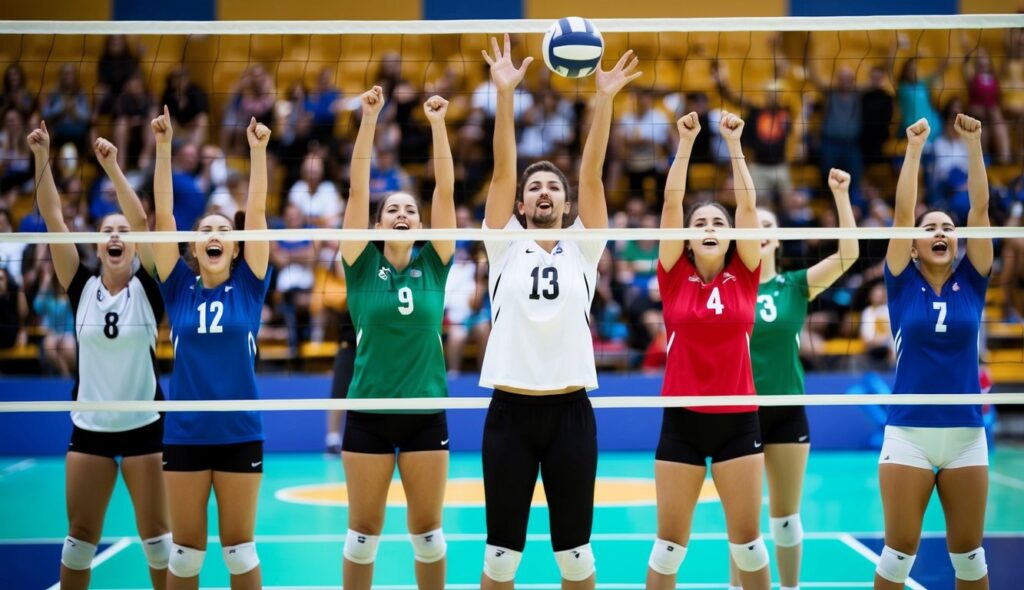
- How did you get started in volleyball?
You likely began playing at a young age, perhaps in school or through a local team. Your interest grew as you developed your skills. - Who is your biggest inspiration in the sport?
It might be a famous player or a coach who has significantly impacted your journey and motivated you to excel. - What is your favorite position to play and why?
You enjoy playing as a setter because it allows you to control the game’s pace and impact every play. - How do you stay fit during the off-season?
You maintain your fitness through a mix of cardio, strength training, and flexibility exercises to keep your body ready for the next season. - What role does nutrition play in your performance?
Proper nutrition fuels your body, aids recovery, and helps you maintain your energy levels during matches and training sessions. - How do you handle pressure during crucial matches?
You focus on your breathing, stay positive, and trust in your preparation and abilities to stay calm under pressure. - What is one of your most memorable matches?
You recall a particular game where your team came from behind to win, showing incredible teamwork and resilience. - How do you balance athletics with academics or work?
You manage your time carefully, set priorities, and adhere to a strict schedule to ensure you excel in both areas. - What’s a skill you’re currently working on improving?
You are focused on enhancing your serve accuracy and power to become a more effective player. - How important is teamwork in volleyball?
Volleyball relies heavily on teamwork, as every player’s contribution is vital to the team’s success. - What does dedication to volleyball mean to you?
It means consistently putting in the effort, learning from mistakes, and always striving to improve. - How do you cope with defeat?
You use each loss as a learning opportunity, analyzing what went wrong and how you can improve next time. - What’s your pre-game routine?
Your routine involves stretching, mental visualization, and fueling your body with a balanced meal. - What specific strengths do you bring to your team?
You are known for strong communication skills, quick reflexes, and strategic thinking. - How do you develop your skills outside of formal practice?
Engaging in drills, watching games, and learning from seasoned players helps you hone your skills. - Have you faced any major injuries, and how did you recover?
Surrounding yourself with a strong support team of doctors and therapists was key to a full recovery. - How do you motivate your teammates during tough times?
Encouragement, keeping morale high, and leading by example inspire your teammates. - How have coaches influenced your playing style?
Coaches have helped refine your techniques and broaden your tactical views on the game. - What qualities make a good volleyball captain?
A good captain is a strong communicator, leads by example, and supports other players. - How do you manage game stress during intense matches?
Focusing on one play at a time and maintaining a positive mindset helps manage stress. - What is the role of mental preparation in your training?
Mental preparation keeps you focused, calm, and ready to meet challenges head-on. - Which player on your team do you admire the most and why?
Admiring a teammate for their hard work and sportsmanship can inspire you to improve as well. - How do you contribute to team culture?
You promote a positive and inclusive atmosphere that encourages mutual support and growth. - What’s your proudest moment in volleyball so far?
Winning a championship or achieving a personal milestone stands out as a proud achievement. - How have you adjusted your play style over time?
Adapting to different team dynamics and embracing new strategies has evolved your play style. - What are your future goals in volleyball?
Aiming for higher competition levels or coaching future players may be among your future aspirations. - How important is flexibility in your training?
Flexibility training helps prevent injuries and improves your performance on the court. - How do you celebrate a win with your team?
Celebrations often include group activities or simply enjoying time spent together post-match. - What key advice would you give to young aspiring players?
Stay committed, practice regularly, and never shy away from learning from your mistakes. - How do you stay motivated during challenging training sessions?
Setting small, achievable goals keeps your motivation high during difficult times. - How do you maintain sportsmanship, even when games get heated?
Respecting opponents and referees, regardless of emotions during the game, is crucial. - What are your thoughts on skill development outside regular practice?
Constantly working on individual skills outside of practice can significantly enhance your game. - How do you interact with fans and the community?
Engaging with fans positively and supporting community initiatives strengthens your connection with them. - How has your dedication to the sport influenced your personal life?
The discipline and commitment required have shaped your character and influenced other life areas. - How does your team work together to achieve common goals?
Clear communication and a shared vision drive your team toward success together. - What’s your go-to strategy during a close game?
- How do you handle training in different weather conditions?
- What strategies do you use to improve your reaction time?
- How do you balance your social life with your volleyball commitments?
- What’s an important lesson you learned from a coach?
- How do you manage travel and competition stress?
- What exercises do you do to build core strength?
- How do you set goals for each volleyball season?
- What makes practices effective?
- Which aspect of your game do you think needs the most improvement?
- Why did you choose volleyball over other sports?
- What role does video analysis play in your training?
- How do you mentally reset after a bad game?
- How do you stay consistent in your play?
- What’s the toughest part of being an athlete?
- How do you define success in volleyball?
- What type of drills do you find most beneficial?
- How important is hydration during matches?
- What do you focus on during practice?
- How does flexibility impact your game play?
- What do you do for injury prevention?
- How do you deal with competitive teammates?
- What traditions or rituals does your team have?
- How do you keep improving your strategies?
- What’s the most challenging team you’ve played against?
- How do you prepare for tournaments physically and mentally?
- What is your favorite memory with your team?
- How do you stay informed about new volleyball techniques?
- What role does feedback play in your development?
- How do you adapt your game play to different opponents?
- What’s the most rewarding part of being a volleyball player?
- What do you enjoy most about volleyball?
- How do you stay resilient after setbacks?
- How do you motivate yourself on tough days?
- What does playing volleyball teach you about life?
- How do you stay connected with your teammates off the court?
- What new skills are you eager to learn?
- How do you approach leadership on your team?
- How does teamwork influence your game strategy?
- What’s your philosophy on sportsmanship?
- How do you adjust your training during the off-season?
- How does confidence affect your performance?
- Which player have you learned the most from?
- How do you handle criticism and use it positively?
- What’s the best advice you’ve received in your career?
- How do you keep your game unpredictable?
- What techniques do you use to improve focus?
- How do you share your knowledge with younger players?
- What is your strategy for handling injuries?
- What’s the importance of having a good coach?
- How do you handle changes in team dynamics?
- What do you do to improve your jumping ability?
- How do you incorporate rest and recovery into your routine?
- What motivates you to keep pushing your limits?
- How does playing volleyball impact your daily life?
- What techniques do you use to improve communication on the court?
- How do you deal with disappointment in your volleyball career?
- What makes a good volleyball match according to you?
- How do you handle playing against a stronger team?
- How do you foster friendships in a competitive environment?
- What is your approach to mastering new volleyball skills?
- What’s your view on sports psychology?
- How do you contribute to your team’s success?
- What strategies do you use to keep the team motivated?
- How do you fine-tune your serving technique?
- What’s an important mindset for volleyball players to have?
- How do you balance improving personal skills with teamwork?
- What’s the best preparation method for games?
- How does your team use video replays for improvement?
- What’s your technique for a successful spike?
- How do you deal with unexpected changes in matches?
- What’s your favorite drill or training exercise?
- How do you manage your time between training and rest?
- What do you think is key to having a cohesive team?
- How do you handle long training sessions?
- What’s your strategy for a comeback during a game?
- How do you plan your nutrition around competitions?
- What role do warm-ups and cool-downs play in your routine?
- How do you handle on-court conflicts with teammates?
- What’s crucial for peak performance in a match?
- How have you adapted your training over the years?
- What mental skills do you find most beneficial for your game?
- How do you ensure effective communication with your coach?
- What motivational techniques do you use before a match?
- What’s your long-term vision for your volleyball career?
Frequently Asked Questions Volleyball Player Interview
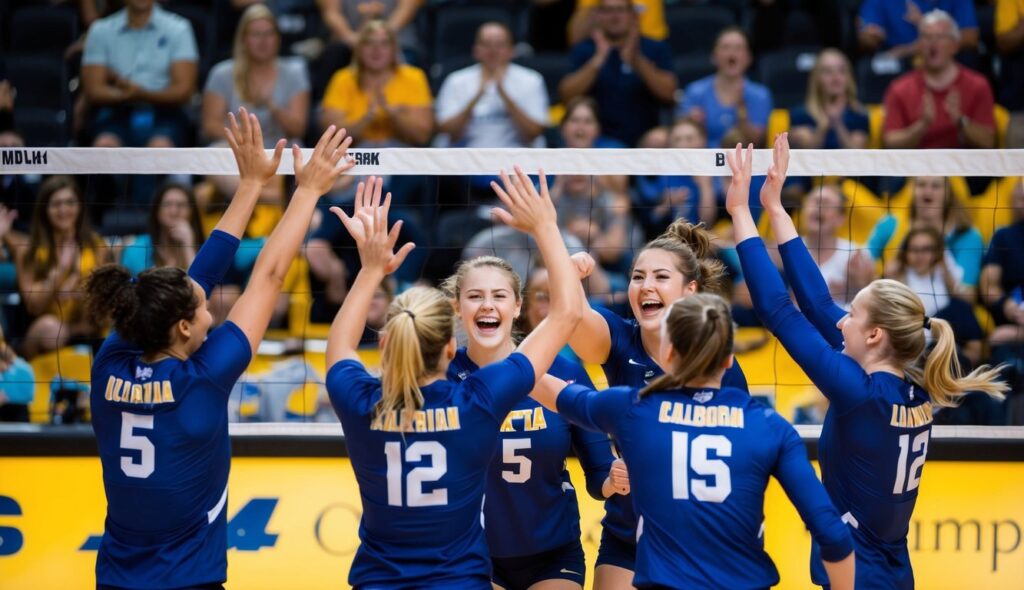
Learn what it’s like to be a volleyball player. Discover their memorable moments, how they prepare for big games, and how they handle pressure. Also, see how they stay motivated and improve their skills.
What has been the most memorable moment in your volleyball career so far?
Each player has unique experiences that stand out. These moments could be winning an important match, setting a new personal record, or being part of a close-knit team effort that led to victory.
How do you prepare mentally and physically before a big match?
Preparation is key. Players often use specific mental routines and physical exercises.
Visualization, meditation, and warm-up drills help them get ready. It’s about focusing the mind and body on the upcoming challenge.
Can you walk us through your daily training routine as a volleyball player?
Weight training and scrimmages are also common parts of their routine to build strength and teamwork.
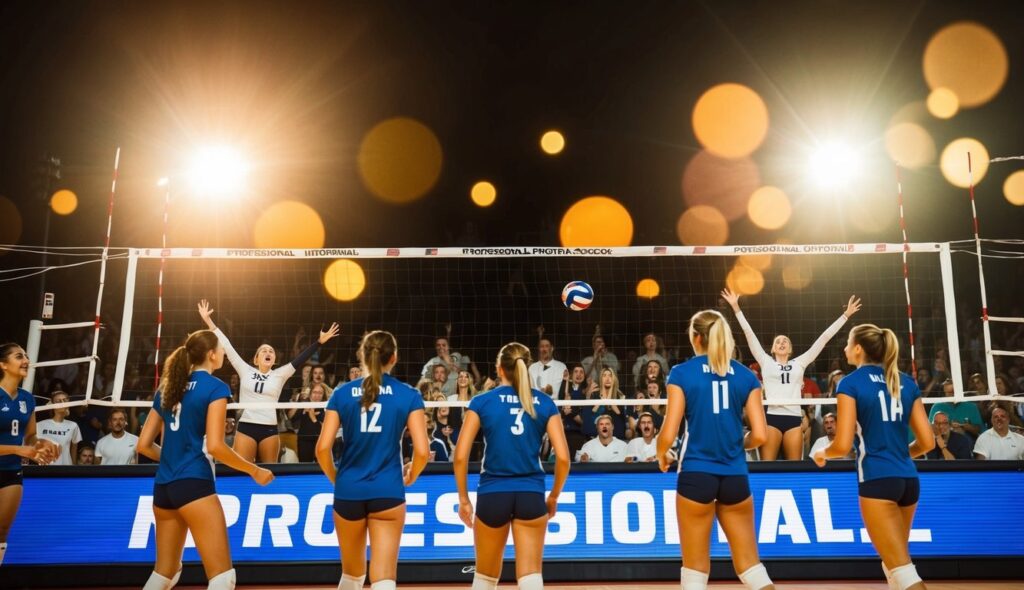
How do you handle the pressure of performing well during critical points in a game?
Staying calm under pressure is crucial. You may focus on deep breathing and positive self-talk. Relying on your training and experience helps you keep stress at bay and perform effectively when it matters most.
How do you assess your own performance after a game and identify areas for improvement?
Self-assessment often starts with reviewing game footage. Players look for strengths to build on and mistakes to correct.
Coaches might provide feedback, while personal reflection helps in setting goals for the next game.
What motivates you to continue improving your skills in volleyball?
Motivation comes from a desire to excel. This might be fueled by personal goals, passion for the sport, or the drive to compete at higher levels.
Setting targets and celebrating small victories keeps you moving forward.
All the Best !




